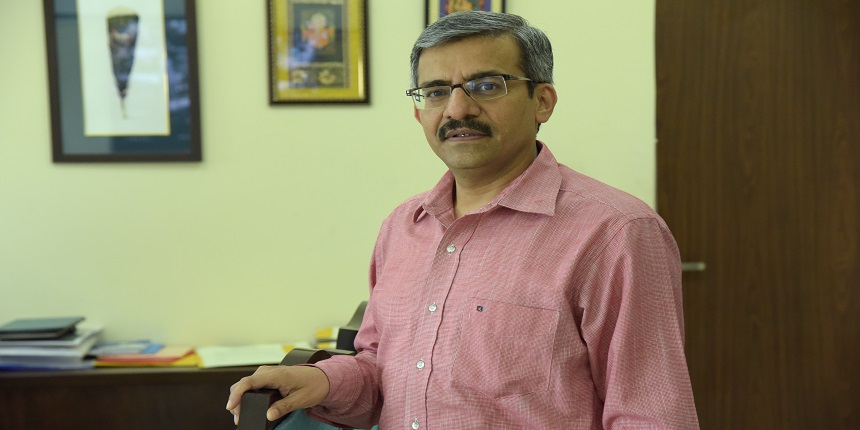“By July we will be done with around 11 exams, 180 subjects in 50 languages involving 60 lakh candidates”
Abhay Anand | July 1, 2019 | 12:30 PM IST | 4 mins read

Vineet Joshi, Director General, National Testing Agency in an exclusive interview with Abhay Anand speaks about the challenges a new testing and assessment body like NTA had to face in conducting examination at pan India level, how digitisation has improved the assessment system and the changes needed in the school education system...
Q. During your tenure at the CBSE many of the examination reforms were carried out, how is your role at NTA different from that at CBSE?
A. At CBSE the major role was the board examination and the board examinations are different in nature they are achievement tests after completing their class 10 or 12 syllabi. The NTA is more than that it is majorly into assessments for the purpose of selection. So, the purpose of the exam here is completely different from what it used to be at CBSE, CBSE also used to do some assessment kind of examination like NET and all.
Q. What are the challenges of heading a body like NTA?
A. The first and foremost thing about NTA is that this body has been formed to conduct the examination in computer-based mode, and in a country like India to conduct a computer-based test without any glitch in various ways. The first challenge is acceptability and candidates do have some inertia, and to overcome that inertia that is one of the challenges. I would not say which form of examination is easy, it depends on how much comfortable a person is with any of the formats. There are certain advantages of online mode over pen-paper mode for the candidate when he fills up the OMR sheet, sometimes he commits some mistakes which cannot be corrected in the offline mode, but can be corrected in online mode.
Q. How do you look at the role of technology in conducting online examination?
A. Technology is playing a very important role, right from establishing the examination centre to conducting exam to results declaration. Like in case of allotting examination centre, it is completely done online without giving favour to anyone of disfavour to anyone. Another thing is that there are huge logistics operations involved in the offline mode of exam, right from the printing of questions paper until its delivery at the examination centre.
Q. How do you look at the journey of NTA in past one year of its existence?
A. NTA came into existence in May 2018 when it was registered at the Registrar of Societies, since then the journey has been quite exciting and till now we have completed something around 7-8 big exams and our calendar is full till July, by that time we will be completing around 11 examinations of roughly 180 subjects in about 50 languages involving 60 lakh candidates.
Q. What all will be the new areas NTA will get into in the coming future?
A. Our priority is not to expand in new areas, our idea is to improve the level of examination, by improving the level of examination we mean that we want to bring it at a level where everybody feels comfortable by appearing in an examination. Right now what we see is that a person coming from financially weak background feels uncomfortable in appearing for competitive exam, we want to remove that barrier. We are trying to do it by making the examination process more scientific, bring it to the level of student and at the same time be able to segregate the better student from not so good student.
Q. You have been at the CBSE for a good period of time and also tried to bring in different types of examination reform, however in the past decade we have seen a trend emerging in which students are getting 497, 498, 499 marks. Is the whole education system not promoting rote learning among students? Are we not in need of an examination system reform?
A. In the Indian context, we definitely need examination reform, we treat examination as something very-very sacred, it is seen as something which every respects. So, now if we have to change the education system, the way teaching-learning is happening, changing the examination system is the easiest thing to do. The way in which exams are conducted, a student learns in the same way, a teacher teaches in the same way, so to change a person’s learning, teaching can be done only if change the examination system.
I personally feel that examination are a way to break the barriers, if a child comes from the good background he will have access to good books, good school, a good teacher and other things, research also says that a person’s education depends on his socio-economic background. So, we have no right to deny a student access to a good education or career just because he comes from a financially weak background. This can happen only when there is a good examination system which tests students on the concepts, their experiential learning.
Right now the assessment system that we have, it facilitates a particular type of students or candidates.
The exam does not depend on one agency or one individual, everybody in the society has a role, it an ecosystem and in this everyone’s support is required.
Follow us for the latest education news on colleges and universities, admission, courses, exams, research, education policies, study abroad and more..
To get in touch, write to us at news@careers360.com.